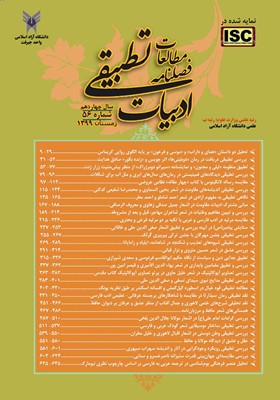نگاهی تطبیقی به مفهوم آزادی در شعر احمد شاملو و احمد مطر
محورهای موضوعی : شعرعبدالحسین فرزاد 1 , یونس مرادی جعفرلو 2 , سمیه مرادی جعفرلو 3
1 - دانشیار پژوهشگاه علوم انسانی و مطالعات فرهنگی
2 - کارشناسی ارشد ادبیات تطبیقی دانشگاه علامه طباطبایی
3 - کارشناسی ارشد زبان و ادبیات فارسی، دانشگاه آزاد اسلامی
کلید واژه:
چکیده مقاله :
احمد شاملو و احمد مطر از سردمداران شعر سیاسی و اجتماعی در ادبیات فارسی و عربی هستند. آزادی و آزادی خواهی از مهم ترین بن مایه های شعر شاملو و مطر است. ما در این پژوهش بر آن شدیم تا به بررسی تطبیقی جایگاه آزادی در شعر این دو شاعر بپردازیم و با بررسی وجوه اشتراک و افتراق آن درک عمیق تری از آن ارائه دهیم. جستار حاضر با تکیه بر مطالعات کتابخانه ای و به روش توصیفی انجام پذیرفته است. ابتدا نمونههایی از اشعاری که به مضمون آزادی اشاره کرده است را در شعر هر دو شاعر یافته و به صورت تطبیقی در کنار هم قرار دادهایم و به چهار مورد زیر تقسیم کردهایم: 1. در حسرت بدست آوردن آزادی 2. آزادی بیان و اندیشه 3. عشق به آزادی 4. آزادی به مثابه انسانیت. در مواردی که ذکر شد شاملو و مطر در زمینه آزادی هم عقیده هستند و هر دو رسالت شعر را رسیدن به آزادی قرارا دادهاند؛ با این تفاوت که زبان شعر شاملو مانند مطر تند و انتقادی نیست.
Ahmad Shamlou and Ahmad Matar are among the leaders in political and social poetry in Persian and Arabic literature. Freedom and liberation are among the most important themes of poetry of Shamloo and Matar. In this study, we decided to have a comparative study of the place of freedom in the poetry of these two poets and to provide a deeper understanding of it by examining the commonalities and differences. The present study is conducted based on library studies and in a descriptive manner. First, we have found examples of poems that refer to the theme of freedom in the poetry of both poets and have comparatively put them together and divided them into the following four items: 1. In longing for freedom 2. Freedom of expression and thought 3. Love of freedom 4. Freedom as humanity. In the cases mentioned, Shamloo and Matar agree on freedom and both have set the mission of poetry to achieve freedom; With the difference that the language of Shamloo poetry is not as sharp and critical as Matar.
قرآن کریم.
برلین، آیزیا. 1380ش، چهار مقاله درباره آزادی، ترجمه محمد علی موحد، تهران: خوارزمی.
پاشایی، ع. 1378ش، نام همه شعرهای تو، تهران: ثالث.
پورنامداریان، تقی. 1390ش، سفر در مه، تهران: سخن.
حسن، عبدالرحیم. 1987م، لقاء مع احمد مطر، العدد 185، لندن: مجله العالم.
سارتر، ژان پل. 1389ش، هستی و نیستی، ترجمه عنایت الله شکیبا پور، تهران: دنیای کتاب.
شاملو، احمد. 1391ش، مجموعه آثار(دفتر یکم)، تهران: نگاه.
شفیعی کدکنی، محمد رضا. 1380ش(2)، ادوار شعر فارسی از مشروطیت تا سقوط سلطنت، تهران: سخن.
شفیعی، کدکنی. 1380ش(1)، شعر معاصر عرب، تهران: سخن.
عایش، محمد. 2006م، احمد مطر شاعر المنفی، بیروت: دار الیوسف.
غنیم، کمال احمد. 1998م، عناصر الإبداع الفنی فی شعر احمد مطر، القاهره: مکتبه مدبولی.
مطر، احمد. 1391ش، درها هم زبان دارند، ترجمه ایاد فیلی، تهران: آوگان.
مطر، احمد. 1395ش، بذر فریاد، ترجمه یونس مرادی جعفرلو، تهران: گل آذین.
مطر، احمد. 2008م، الاعمال الشعریة الکاملة، لندن: دار المحبین.
نوری زاد، محمد حسین.1380ش، چهار افسانه شاملو، تهران: دنیای نو.
مقالات
براهنی، رضا. پاییز و زمستان1384، «گفتمان دو سویگی در شعر شاملو»، فصلنامه گوهران(ویژه نامه شاملو)، شماره نهم و دهم، صص 36-65.
کبوتری، جواد و حسین آریان و معصومه بخشی زاده. زمستان 1396، «نگاهی تطبیقی به شعر احمد
شاملو و احمد مطر»، فصلنامه مطالعات ادبیات تطبیقی، سال یازدهم، شماره 44، صص 9-44.
_||_
The Holy Quran.
Berlin, Izya. 2001, four articles about freedom, translated by Mohammad Ali Movahed, Tehran: Kharazmi.
Pashaei, A. 1999, the name of all your poems, Tehran: Sales.
Pournamdarian, Taqi. 2011, Journey in Fog, Tehran: Sokhan.
Hassan, Abdul Rahim 1987, meeting with Ahmad Matar, number 185, London: Al-Alam Magazine. Sarter, Jean Paul. 2010, Existence and Non-Existence, translated by Enayatollah Shakibapour, Tehran: Book World.
Shamloo, Ahmad 2012, Collection of Works (Book One), Tehran: Negah.
Shafiee Kadkani, Mohammad Reza 2001 (2), Periods of Persian poetry from constitutionalism to the fall of the monarchy, Tehran: Sokhan.
Shafi'i, Kadkani. 2001 (1), Contemporary Arabic Poetry, Tehran: Sokhan.
Ayesha, Mohammad 2006, Ahmad Matar, poet of Al-Manfi, Beirut: Dar Al-Youssef.
Ghanim, Kamal Ahmad 1998, Elements of Technical Innovation in the Poetry of Ahmad Matar, Cairo: Madbouli School.
Matar, Ahmad 2012, Doors have the same language, translated by Iyad Fili, Tehran: Avogan.
Matar, Ahmad 2016, The Seed of Scream, translated by Younes Moradi Jafarloo, Tehran: Gol Azin. Matar, Ahmad 2008, Complete Poetry Works, London: Dar Al-Mohebin.
Nourizad, Mohammad Hossein. 2001, Four Legends of Shamloo, Tehran: New World.
Articles
Braheni, Reza. Fall and Winter 2005, "Two-Sided Discourse in Shamloo Poetry", Gohran Quarterly (Shamloo Special Issue), Ninth and Tenth Issues, pp. 36-65. Kabutari, Javad and Hossein Arian and Masoumeh Bakhshizadeh. Winter 2017, "A Comparative View at Poetry of Ahmad Shamloo and Ahmad Matar", Quarterly Journal of Comparative Literature Studies, Eleventh Year, No. 44, pp. 9-44.

